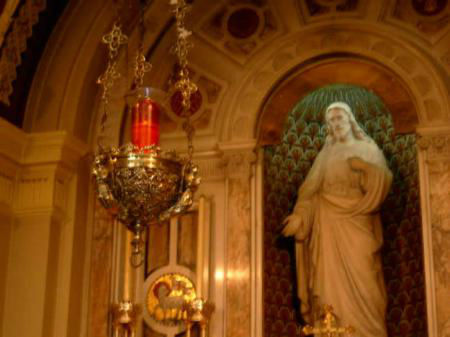Selling the sanctuary lamp / Offering day to Jesus and Mary
Q. The parish I have attended for the last 30 years was recently assigned a new pastor. He puts great emphasis on collecting money, even though it is already a wealthy parish with generous parishioners, and he has started many new cash-generating practices.
In addition to offering, for a fee, the remembrance of deceased loved ones through a printed announcement in the bulletin, he has begun "selling" the sanctuary candle for the same purpose. I was always taught that the reason for the sanctuary lamp is to signify the physical presence of Christ in the tabernacle. (Actually, he is collecting on two such candles, as there is another one in our adoration chapel, which can be had for a nominal amount!)
What could be the next step, selling indulgences? At this rate, I would expect to be an active participant in the next Protestant Reformation! Am I wrong to feel this way? (City of origin withheld)
A. Your question has caused me to examine my conscience. In our parish, at Christmas and Easter time, we offer people the opportunity to purchase flowers for the sanctuary in honor of departed family members.
The names of the deceased are then published in the parish bulletin with the hope that parishioners will think to pray for them. To my knowledge, no parishioner has ever objected to this practice and many are grateful for it. No profit comes to the parish, since the donation is simply a pass-through to the florist for the poinsettia or lily plant.
But flowers are a whole lot different from a sanctuary lamp. You are correct as to its purpose. Following the church's Code of Canon Law (No. 940), the General Instruction of the Roman Missal provides in No. 316 that "in accordance with the traditional custom, near the tabernacle a special lamp, fueled by oil or wax, should shine permanently to indicate the presence of Christ and honor it."
To offer that candle for another purpose -- even to honor a departed loved one -- just doesn't have the right "feel" and strikes me as compromising something very sacred. I think you would do well to make your feelings known to your pastor or to a member of your parish council.
Q. I am grateful for your column and excited to see what issues you will be tackling that particular week. But as an owner (and reader) of the Catechism of the Catholic Church, I am sometimes surprised at the level of the questions; perhaps the catechism should be prescribed reading for the laity -- but then you would be out of a job!
That having been said, I do have a question myself. (Pride goeth before the fall!) I am a member of the Apostleship of Prayer and the Militia of the Immaculata. Both groups provide a morning prayer of dedication -- offering all my thoughts, words and deeds of the day. But one directs this dedication to Jesus, and the other to Mary. Isn't that mutually exclusive? How can I offer myself totally to both of them? (Craigsville, Virginia)
A. I think you would do best to relax and let Jesus and his mother sort this out. Both practices -- offering the day's activities to Jesus or to Mary -- are noble and good. (Technically, I suppose, in the second instance what you're really doing is offering the day to the Lord through Mary's intercession.)
You should be comforted by the memory of one of our most recent saints, Pope John Paul II. His papal coat of arms displayed a prominent Marian symbol and his apostolic motto referred to Mary with the Latin words "Totus Tuus," meaning "totally yours." The saintly Karol Wojtyla had no hesitation in offering his day and his papacy to our lady.
---
Questions may be sent to Father Kenneth Doyle at askfatherdoyle@gmail.com and 40 Hopewell St. Albany, N.Y. 12208.
- Father Kenneth Doyle is a columnist for Catholic News Service



















